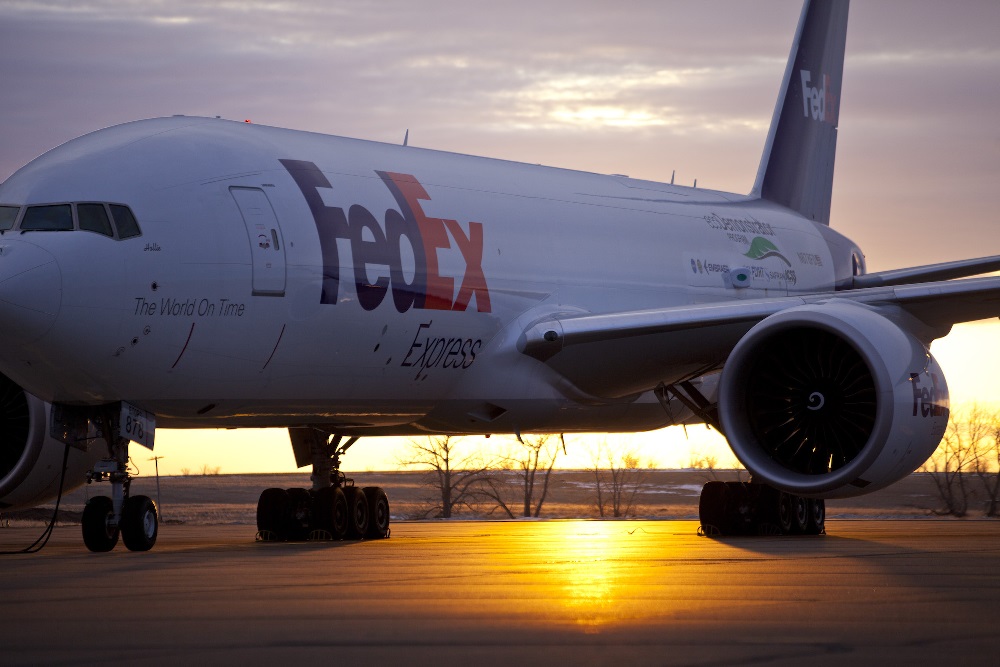FedEx has announced its first major deployment of sustainable aviation fuel (SAF) in the United States with the purchase of over three million gallons of blended SAF from Finland-based producer Neste. The fuel, blended with at least 30% neat SAF, will support FedEx’s cargo flight operations from Los Angeles International Airport (LAX) over the next year. The volume will account for approximately 20% of the jet fuel FedEx consumes annually at the airport.
The agreement represents a significant step in FedEx’s broader sustainability ambitions. In 2021, the global logistics firm committed to becoming carbon-neutral across its operations by 2040. As part of that pledge, FedEx allocated $2 billion towards initiatives including fleet electrification, renewable energy, and carbon sequestration. More information on the company’s climate strategy is available through its 2021 announcement to become carbon neutral by 2040.
Karen Blanks Ellis, Chief Sustainability Officer and Vice President of Environmental Affairs at FedEx, described the SAF procurement as a vital element in the company’s emissions-reduction roadmap.
“Procuring SAF is an important component of our aviation emissions-reduction strategy in the coming years, and we are pleased to have executed a deal with Neste to begin using this fuel in our air operations,” said Ellis. “Our aviation network represents the largest amount of FedEx fuel use globally and, as a result, is our biggest opportunity to drive down emissions. As we work toward our goal of carbon-neutral operations by 2040, we need the SAF market to continue to grow to meet industry demand.”
Neste’s sustainable aviation fuel—marketed under the brand Neste MY SAF—is made from renewable waste and residue materials such as used cooking oil and animal fats. It is fully compatible with existing aircraft engines and airport fuel infrastructure, allowing for immediate integration without technical modifications. According to the company, its SAF can reduce lifecycle greenhouse gas (GHG) emissions by up to 80% compared to traditional fossil-based jet fuels.
Neste currently holds a leading position in the production of SAF, with an annual global output capacity of 1.5 million tonnes (equivalent to about 515 million US gallons). The company is also one of the world’s largest producers of renewable diesel.
Carl Nyberg, Senior Vice President, Commercial, Renewable Products at Neste, commented: “Neste is excited to work with FedEx and support their ambitious goal of reaching carbon-neutral operations by 2040 with our SAF. Recognising the important role of air cargo in the global economy, FedEx is demonstrating how this industry can leverage available lower-emission solutions like SAF to reduce its environmental impact. We look forward to further strengthening our cooperation.”
The aviation sector faces significant pressure to decarbonise. Globally, aviation accounts for roughly 2.5% of carbon dioxide emissions, but its high-altitude emissions have a larger warming effect due to contrails and other non-CO₂ emissions. Air freight, while representing less than 1% of total cargo volume by weight, contributes disproportionately to aviation-related emissions due to its high fuel intensity. According to the International Air Transport Association (IATA), SAF is considered the most promising near-term solution to reduce the carbon footprint of air travel and freight, with a target for SAF to account for 65% of aviation’s carbon reductions by 2050.
Despite growing interest and commitments across the aviation and logistics industries, SAF currently makes up less than 0.1% of total global aviation fuel use. Scaling production and adoption remains a challenge, requiring significant policy support, investment, and cross-sector collaboration. In the United States, the Inflation Reduction Act of 2022 introduced SAF tax credits to help bridge the price gap between sustainable and conventional fuels, while the European Union has adopted a SAF blending mandate under its ReFuelEU Aviation programme.
FedEx’s move aligns with similar efforts from industry peers, including DHL and UPS, in pursuing more sustainable operations. As pressure from regulators and stakeholders mounts, the role of SAF will become increasingly central to the air freight industry’s climate strategies.




